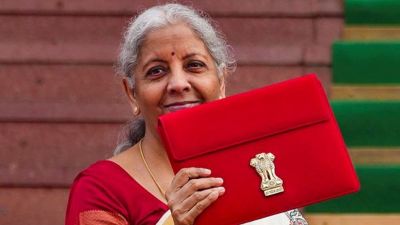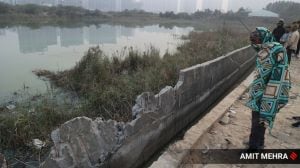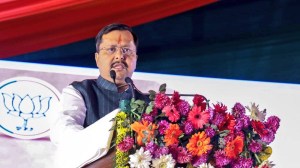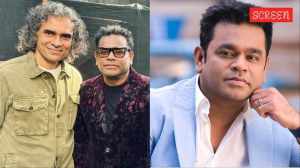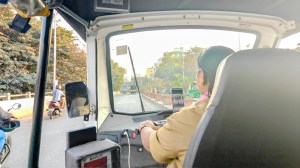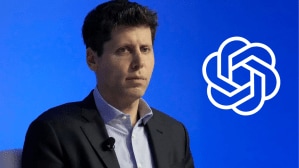Minority Report
Lucknow Naseem Iqtidar Ali Member, AIMPLB 8220;Muslims have become so timid. In Gujarat during the recent rath yatra they stood in li...

| Pampered 038; appeased? Below 40 per cent: Overall literacy among Muslims; 34 per cent: Literacy among Muslim women National Family Health Survey 2001; 12 per cent: Strength of Muslims in government service since 1947; 62 per cent: Muslim males unemployed or underemployed India Human Development Report 1998; 10 per cent: Work participation rate of Muslim women |
EVERY afternoon, the shadow of Delhi8217;s Jama Masjid falls across twin pyramids of ladies underwear in the Meena Bazaar outside. In the bazaar of the grand mosque, Mohammad Shamim and Mohammad Salauddin hawk their wares all day. On some nights, the police rushes in and dumps their merchandise into sewers. 8216;8216;If you protest, anything can happen: POTA, or NSA or SIMI.8217;8217; They know the legalese: even if you8217;re an illiterate Muslim vendor selling panties outside the Jama Masjid, you better know the law.
8216;8216;Nothing but a masjid at Ayodhya!8217;8217; thunders Hafiz Mohammad Javed who runs a madrasah nearby, 8216;8216;from earth to sky there is only masjid.8217;8217; So what do Shamim and Salauddin want, a mandir or a masjid? They are unanimous: 8216;8216;We want more people to buy our underwear.8217;8217;
One community, a thousand different voices. Voices fearful and hushed after five-and-a-half years of a government which doesn8217;t like them. Voices that have become fiercely militant and hate-filled. Voices that have forgotten how to laugh, or how to file an FIR, voices that are tired of apologising for being Indian.
| Lucknow Naseem Iqtidar Ali Member, AIMPLB 8220;Muslims have become so timid. In Gujarat during the recent rath yatra they stood in line with their heads bowed and hands folded.8221; |
Professor Shamim Ahmad, ex-VC of Aligarh Muslim University had his electricity and phone lines cut on charges that he was a Pakistani. It later transpired the police had been mistaken on his identity. In a residential colony in Lucknow, all boys between 15-25 were imprisoned without proper charges and one of them has become insane after his experiences in jail. In Barabanki, a young timber merchant found his name struck off the municipal electoral rolls. In Lucknow, a student who won a motorcycle race was only given the second prize after the jury discovered he was a Muslim. Ram Advani, who has been running the legendary Ram Advani Booksellers in Lucknow for the last 40 years, was stopped and questioned by the police because he had a beard.
In the old Sabzi Mandi in Faizabad, all Muslim shops have been demolished by a district magistrate who has publicly declared that he belongs to the RSS and hates all Muslims. Mohammad Waseem, a property dealer in Faizabad, says if a Muslim prospers in his business, he has to pay hafta to numerous functionaries and if he delays on payments by even a day, his doors and windows are ripped up and taken away. In Faizabad, butchers are still in jail on trumped-up charges that they8217;ve slaughtered cows. The son of Noor Mohammad, former member of the Faizabad Nagar Palika, was imprisoned after he refused to bribe a policeman. 8220;Hamari Rozi roti mar chuki hai,8221;says Mohammad Rais Khan, a tailor in Ayodhya, and 8220;on top of that there is constant fear. We are scared to file an FIR. Scared to report a robbery. Just keep your head down and don8217;t make a noise.8221;
8216;8216;The Muslim community is searching in darkness, in the wilderness, lost and confused,8217;8217; says former MP Syed Shahabuddin. 8216;8216;For the first time, the law is no protection. The secular parties can8217;t help. Urdu is dying. Muslim monuments are in ruins. Our size and variety is our problem as we cannot unite.8217;8217;
The dream is dead
| Faizabad Mohammed Waseem Property Broker 8220;If a Muslim prospers in his business he has to pay hafta to many officials. If he delays on a debt, they harass him. And rip up his doors and windows and take them away.8221; |
8216;Secular Family Restaurant8217; serves hot samosas and tea on the G.T. road from Delhi to Aligarh and is owned by a Muslim. 8216;8216;Before 8217;87, that was the time of dreams,8217;8217; says Shireen Moosvi, dean of the History department at Aligarh Muslim University, 8216;8216;we would all be Nehru8217;s new Indians. We would wage war on mass poverty. We would defy religious orthodoxy. But the dream is dead.8217;8217;
AMU looks forlorn and deserted as this is vacation time. The huge sandstone Faiz gate has looked down for a century-and-a-half on Sir Sayyid Ahmad Khan8217;s dreams of creating an enlightened Muslim professional middle-class that would be forward-looking and progressive. 8216;8216;The Aligarh movement aimed at creating a progressive Muslim opinion is being exterminated,8217;8217; says Nadeem Asrar, the last elected student president of the university. 8216;8216;This is because every time you paste a pamphlet, there is a show-cause notice. If you gather in a group of five you may be charged under NSA.8217;8217; In AMU and Jamia Milia Islamia, students8217; debates are sternly discouraged.
Moosvi, who has twinkling eyes and a sudden mischievous grin, once played a trick on a group of sadhus visiting her neighbour8217;s home. The sadhus declared they wouldn8217;t eat from the neighbour because he was a bania, so Moosvi immediately volunteered to serve them. 8216;8216;I fed them so much that they were almost breathless and the sadhus kept looking at me and saying, 8216;naak nakshe se Brahmin ladki hai. Brahmin ladki hai! By her looks, she8217;s a Brahmin8217; Little did they know who I really was!8217;8217; She read Pandit Brij Narain Chakbast8217;s Ramayan in Urdu and was astounded when her colleagues expressed shock that she wanted to live in Vikram Colony in Aligarh. 8216;8216;You? You want to live in Vikram Colony?8217;8217; they asked her. It hadn8217;t occurred to Moosvi that Aligarh8217;s ghettoisation is now almost complete and Hindus and Muslims live in completely separate areas.
Paradise in wilderness
| Ayodhya Mohammed Rais Khan Tailor 8220;Hamaari rozi roti mar chuki hai. We are scared to file an FIR, scared to report a robbery. Just keep your head down and don8217;t make a noise.8221; |
The accommodation available for Muslims in Turkaman gate bypass or Shahjamaal in Aligarh might make Omar Khayyam question his lyrics about wilderness and paradise. Avalanches of filthy water gush past fetid tenements. Piles of refuse swell in front of every door. Children drink water flavoured with speckles of excrement. There have been two cases where small children have actually drowned in the water flowing past their homes in Shahjamal.
In contrast, Hazratganj in Lucknow is bathed in amiable twilight. Greetings are exchanged, tunde kebab is eaten and Ram Advani8217;s bookshop is a centre of many addas. In the genteel old Lakhnavi homes with their open courtyards, climbing bougainvillea and the sweet scent of khus, you8217;ll find the sweetest language in India. Urdu is never more compassionate or more intimate than when spoken by the aristocratic, bespectacled Naiyer Masud, whose stories have been published in English, Finnish and German. His huge room where he reclines on a divan is lined with black-and-white portraits. Leather-bound books reach upwards to the high ceiling. On the terrace, the railings have been sculpted to read 8216;Live and Let Live8217;.
8216;8216;There is an aimlessness, a goallessness. Muslims have remained uneducated because they have traditionally looked down on professionals and looked down on education,8217;8217; Masud says.
In the slums behind the old family homes, 12-year-old Mohammad Mir and 16-year-old Noor Mohammad work 15-hour days binding books and get Rs 40 per day. Their work is seasonal, but when they get it, they leave school. Their father is a tailor and their mother looks after their six siblings. When their eldest brother went for a job as a typist, he was rejected after he didn8217;t satisfy his interviewers with the answers he provided on Kashmir. Noor mutters that many of his brothers have joined the tabligh; in Lucknow government officers whisper about the rising numbers of youth joining SIMI in Bahraich and Gonda.
The Muslim faces an 8216;integration8217; versus 8216;assimilation8217; dilemma. Naseem Iqtidar Ali, the only woman member of the AIMPLB executive committee, says she was shocked at the way Gujarati Muslims bowed their heads and folded their hands during the recent rath yatra in Ahmedabad. 8216;8216;Why have Muslims become so servile to Hindus?8217;8217; she asks. 8220;The Muslim riot victim in Gujarat has been far less assertive about their rights than for example, the Sikhs of Delhi,8221; says historian Salim Kidwai, 8220;this is because anti Sikh riots probably won8217;t happen again. But violence against Muslims will always recur.8221; Hafiz Abdul Hafeez, ulema of the Jamaat-i-Islami, says Muslims can never agree to the uniform civil code. He believes women should remain within the Koranic 8216;circle8217; and not try and adopt the unnatural ambitions of trying to be like a man. 8216;8216;Integration, yes, assimilation, no,8217;8217; says Shahabuddin. The age-old competitiveness with the Hindu remains among those whose collective memory is of ruling India.
In isolation
Yet the Muslim today, more than ever, is imprisoned in a water-tight self-enclosed universe. In Barabanki, Abdul Mahboob Rizvi, an advocate, says he only serves a Muslim clientele and no Hindu ever comes to him. In Lucknow, Irfan Siddiqui8217;s journal is only read by Muslims. Mohammad Nadeem, descendant of the Firanghi Mahal ulema now studying for an MBA and once employed in a call centre, says even if he wanted to marry a Hindu girl, he would not be allowed. Moosvi says students at AMU crave protection so much that they huddle in the safe ghetto of the university and meet the same people all their lives. Shahryar, poet and lyricist of Umrao Jaan and Aligarh resident, says the Muslim is far more intolerant than the Hindu. 8216;8216;No Muslim, for example, will ever say that Babri Masjid is a non-issue.8217;8217;
Syed Jalaluddin Mohammad Matin, ulema of the Firanghi Mahal in Lucknow, is a character out of Shatranj ke Khiladi. He lives in a crumbling old home in the inner rooms of Firanghi Mahal. Dressed in flowing white complete with fez and beard, he8217;s now teaching himself Bengali because he loves Calcutta. He says pan-Islamism is 8216;8216;humbug8217;8217; and the only thing that matters to him is that he8217;s from Lucknow. 8216;8216;Every Holi and Diwali, after the formal ceremonies, Hindus and Muslims would eat together in Lucknow. Now these young unemployed bearded fanatics think that qawaali is un-islamic. Hindus and Muslims are more similar than they think. We even have a caste system. No sayyid will ever marry a kasai8217;s daughter, let me tell you that!8217;8217; he retorts.
The fact is, that there8217;s never been a communal riot in Lucknow. 8216;8216;You won8217;t find people like Matin miya today,8217;8217; says Nasir Abid, a documentary filmmaker. 8216;8216;Now young boys are all growing beards.8217;8217;
Gunned town
| Barabanki Abdul Mabood Rizvi Advocate 8220;I serve only a Muslim clientele. It is almost unthinkable for a Hindu to come to me or ask for my advice.8221; |
If Lucknow is soft velvet, then Azamgarh is hard stone. This is a crowded chaotic town, with ruined buildings, unpainted walls and vomit stains on bazaar walls. A flourishing hawala market rages in the streets. In Abu Salem8217;s hometown, there are 7-8 murders every day and several youths are recruited for the underworld. Taj Azmi is a streetside poet. He says his friends are 8216;8216;angry8217;8217; and many are taking the 8216;8216;wrong path8217;8217;. The SP of Azamgarh lives in a fortress, in a house with high gates and divisions of armed guards. Most homes are barricaded with walls although Mohammad Rahimatullah, teacher at Shibli Nomani College, insists that Azamgarh is still a centre of learning.
Yet gun-making is lucrative here. The katta country-made pistol -making village at Bamhaur on the outskirts of Azamgarh is a thriving industry. The gun that killed Gulshan Kumar had 8216;Made In Bamhaur8217; written on it. 8216;8216;There are very fine guns in Bamhaur,8217;8217; says Qazi Abdul Wafi, who runs Qazi Gun House, 8216;8216;excellent 303s are available.8217;8217;
Among the believers
| Aligarh Nadeem Asrar Former president, AMU Students8217; Union |
Driving from Azamgarh back towards Lucknow via Gorakhpur and Basti, the road wanders into a fairy tale landscape. The monsoon has sprayed the fields with thick green. Rising up ethereally from the shining rice paddies are many new whitewashed madrasahs. One here, another there, a third up the road. Many parts of UP have become madrasah country.
There is an anxiety to prove that the madrasah is simply a religious school but at the Deoband Dar-ul-Uloom, parent seminary of the Taliban, Osama bin Laden is a hero. There is anger and frustration that Muslims cannot join the army or get mainstream jobs and boys demand to know exactly what India has done for them.
8216;8216;The ulema of the madrasahs have always fought for India,8221;says Maulana Abdul Khaliq Madrasi, deputy VC of the Deoband Dar-ul- Uloom, 8220;because the British wanted to make us Christian in heart and mind. Not a single graduate of any madrasah has done anything against India so far.8217;8217; Madrasi says he8217;s a Gandhian. He says the Mussalman and the chamar are the two baels bullocks carrying the cart of Hindustan.
Classrooms spill onto a neem and moolsari tree-lined courtyard. Boys from Bengal and Bihar mull over their books. 8216;8216;These boys are so poor that they sometimes don8217;t even want to go home because there8217;s no food there.
Madrasahs are nothing but the Muslim welfare state,8217;8217; says Maulana Khalid Rashid of the Lucknow Idgah. 8216;8216;Graduates either join AIR or some small embassies. There is no ISI here.8217;8217; But some of the boys are more blunt: 8216;8216;Hindu ki hukumat khatam karna hi hoga.8217;8217;
Something about the word 8216;Mussalman8217;, Muslim8217;, Mohammedan8217;. A word to be uttered under the breath, a different sort of a word. And no one is more oppressed by this word than the Muslim himself. He is fearful, he clings to the hope and belief that the liberal Hindu is on his side. But others, such as the youth of Bahraich and Azamgarh, have given up on India and turned to fanaticism. The ulema remain fiercely orthodox and the liberal Muslim is being snuffed out. He loves his mazhab as much as he loves Lucknow and Aligarh, but for the first time he finds his existence threatened not just by his neighbours but by the state itself. In spite of this, there are teachers like Shireen Moosvi; timid slum-dwelling workaholics like Mohammad Mir; bon vivants like Matin miyah. And there are those others who take the road to Azamgarh to buy themselves a katta.
- 01
- 02
- 03
- 04
- 05


